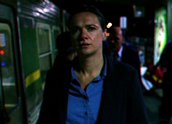


Noise (2007)
Synopsis
Lavinia Smart (Maia Thomas) walks into a carriage full of dead and dying passengers on a suburban train in Melbourne. She survives an encounter with the killer but he steals a framed photograph that has her name on the back. After a young woman is murdered in another suburb, Constable Graham McGahan (Brendan Cowell) is sent there to staff a police caravan that’s open all night. McGahan is supposed to collect statements from the public, but all he gets are drunks, crazy people and Lucky Phil (Simon Laherty), a young man with a mental disability. McGahan suffers from tinnitus, a ringing in the ears that makes him feel very isolated. The all-night vigils in the caravan make him feel even less like a real policeman. He hasn’t told his partner Caitlin (Katie Wall) about the tinnitus, because he fears he may have a brain tumour. As Christmas eve approaches, his hearing deteriorates further and he realises the train killer is watching the caravan.
Curator’s notes
Writer-director Matthew Saville has said he started writing Noise the day after the Port Arthur massacre, in an attempt to make sense of what he and a lot of other people were feeling. He had himself suffered from the effects of tinnitus, which he uses in the film to increase Constable McGahan’s sense of isolation, and the panic he feels in being unable to escape from his own head. The killer is a kind of counterpoint character – since he too has a kind of pain in his head that’s inescapable.
One of the questions that Saville’s smart script is asking is what effect chronic isolation can have on a nation, not just a character. Noise is a genre film with a plot about a serial killer, a bunch of cops, and a witness in fear for her life – but it doesn’t feel at all familiar in its style or concerns. It does feel very Australian, and one of its concerns is whether isolation from the rest of the world has somehow affected our culture. ‘I was really interested in that theme of isolation,’ Saville has said, ‘because I think it’s sort of an indelible part of our national character in that we’re – as our former Prime Minister so elegantly put it, you know – we’re at the arse end of the world… I think that’s actually coloured our national character over the last 200 years. A lot of us behave in a certain way, which is sort of MaGahanesque.’
In one sense, the film is about two main characters reacting to extreme stress – one male, one female. Lavinia also fears for her life, but for a different kind of reason (the killer knows her name).
One of the surprises is how optimistically Saville resolves some of the questions in the script. Noise starts as a depiction of a world in chaos. Angry people are everywhere, hurting each other, with the Martin Bryant-like killer at the worst end of the spectrum. By the end of the film, the main characters have achieved a certain state of equilibrium – not exactly grace, but a stronger sense of connection and self. The final cathartic scene is a remarkably bold finale – a shoot out on Christmas eve, complete with a symbolic rebirth of a child and a strong light from overhead (it’s a helicopter rather than God, but we get the suggestion). Noise is one of the strongest debuts by an Australian film-maker in the last few years.



